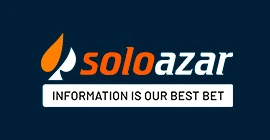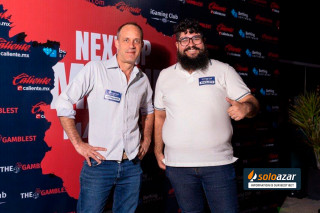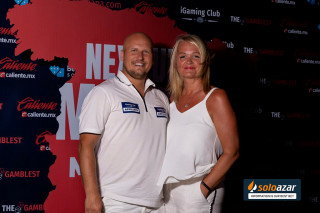How Much It Costs to Kick Off Your Own Gaming Venture in 2025
Tuesday 23 de September 2025 / 12:00
2 minutos de lectura
(Douglas).- Considering a leap into the iGaming industry? Whether it’s a long-standing ambition or a fresh idea gaining momentum, one question inevitably arises early on: What will it truly cost to get started? And we’re not just talking about the tech stack. From platform development and licensing to payment systems, marketing strategies, and staffing—there’s a complex web of expenses that rarely make it into those enticing “launch your sportsbook today” headlines. Altenar analyses this in the following article.

So, you're thinking about launching an iGaming business. Perhaps it’s something you’ve been planning for years, or maybe the idea just started to take shape. Either way, it doesn’t usually take long before the big question comes to mind: what’s it really going to cost? And not just the tech. The whole thing. Platform, licensing, payments, marketing, staffing, all the moving parts that don’t show up in those ‘start your sportsbook today’ headlines.
That’s what this article is here to achieve. Because the truth is, there’s no one-size-fits-all number. Cost depends on how you build, where you launch, and how much of the operation you want to own outright. If you’re serious about building an iGaming business - whether it’s a sportsbook, online casino or both - this guide aspires to provide the clarity you’ve been looking for.
Three Paths to Market
Operators and entrepreneurs entering the iGaming market have three distinct paths to launch: white label, turnkey, or full independent build. Each offers a different mix of speed, control, and cost. Choosing the right one is a must in today's business environment, as getting it wrong could cost you more than you think.
White-Label Solution
Lower Upfront Costs, but Less Control
For new market entrants, white-label platforms offer a practical route to launch with minimal friction. The provider supplies the core infrastructure in sportsbook markets, online casino games, licensing, payments, and tech support, enabling operators to focus on branding and customer acquisition. Time to market is short, and the initial investment is significantly lower than other models.
But that simplicity comes with limitations. Customisation is minimal, product control is limited, and the revenue-share model typically applied can erode long-term profitability. Operators are also dependent on the provider for platform updates, regulatory compliance, and content changes.
While launching a white-label iGaming business remains an efficient and accessible starting point, it’s best suited to those prioritising speed over control, or those seeking to validate a concept before committing to deeper investment.
Turnkey Platform Partnerships
Balancing Speed with Control
Turnkey solutions occupy a middle ground between white-label simplicity and the full autonomy of a self-build. Operators retain ownership of the brand and licence, but outsource much of the technical heavy lifting in platform infrastructure, game integrations, payments, and typically in ongoing support. This model appeals to those looking for more control without reinventing the wheel. It allows for tailored front-end development, greater influence over content strategy, and operational flexibility.
But with that flexibility comes greater responsibility. Compliance oversight shifts to the operator, as do hosting and risk protocols. Costs are higher than white label, and timelines are generally longer, but with that said, the trade-off is meaningful.
For serious operators with a clear vision, turnkey platforms offer a structured yet scalable route into the market.
Full Independent Build
Maximum Control, Maximum Commitment
Building an iGaming platform from the ground up offers unmatched control but requires significant capital, expertise, and long-term commitment. Every component, from the sportsbook engine to player wallets, back office, and CRM, must be developed, integrated, and maintained in-house or through bespoke partnerships. Operators must secure their own licensing, payment infrastructure, game content deals, and compliance systems, all while managing hosting, security, and technical support.
The upside is total ownership of the product and IP, with the freedom to innovate on your terms. But the risks are considerable. Timelines are long, overheads are steep, and oversights can be costly. This path is typically reserved for well-funded ventures with clear strategic intent, existing experience, and the stamina to see it through. The rewards for those who get it right can be substantial.
Cost Breakdown by Category
Launching a gaming business involves more than platform fees and licensing paperwork. Real costs emerge in tiers: infrastructure, payments, compliance, staffing, etc. Each is essential but potentially costly, especially when underestimated. Here’s a closer look at where the money goes.
Licensing and Legal
Think of the licence as your industry passport. Without it, you’re not just stuck at the border, you’re off the grid entirely. In this respect, the price tag attached to a licence is rarely the issue since it’s the access, trust, and operational stability that determine whether your model can scale and succeed.
Costs vary by jurisdiction. Malta, the Isle of Man, and Curaçao, for instance, each have different price tags, reputational weight, and compliance demands. Beyond licence fees, operators must also factor in legalities such as company formation, legal counsel, and ongoing reporting. It’s a non-negotiable foundation, generally expensive, but an even more costly one to get wrong.
Technology and Infrastructure
This is where everything starts to take shape and costs quietly stack up. Platform architecture, game APIs, payment routing, wallet systems, CMS, back office, player management, hosting, and uptime protections all fall under this layer. Even with a third-party provider, the level of customisation, scalability, and resilience required adds cost and complexity.
Those building in-house face heavier upfront spend, but even plug-and-play setups demand real investment in stability. Go too lean, and you’ll feel it later with bottlenecks in load times, system failures during peak traffic, and limited flexibility when your strategy changes. Infrastructure rarely wins awards or headlines, but it's the foundation that supports performance, trust, and long-term growth.
Payment Systems and KYC
Getting paid and staying compliant while doing it is rarely as straightforward as it sounds. PSP integrations, settlement flows, FX handling, chargeback protection, and fraud tools all come with technical and financial overheads. The same goes for KYC. Whether automated or manual, onboarding systems must meet local regulatory standards, protect against AML breaches, and deliver a user experience that doesn’t scare off legitimate players.
Operators entering regulated markets face rising expectations around source-of-funds checks, affordability screening, and secure data storage. These generally aren’t optional extras, and they’re not cheap. Providers charge integration fees, percentage-based transaction costs, and in some cases, monthly minimums. Negotiate well, but budget seriously. Weaknesses in this area can include closed accounts, stalled growth, or worse.
Marketing and Customer Acquisition
No matter how strong the platform, players don’t arrive by accident. Acquisition is one of the biggest, and sometimes one of the most volatile, expenses in an iGaming operation. Paid search, affiliate deals, influencer campaigns, bonus strategies, and media efforts all require capital up front, usually before any revenue return. Affiliates alone may take 25–40% of player lifetime value.
Then there’s customer retention to think about. CRM platforms, loyalty tools, and reactivation flows all carry subscription or development costs. Operators must also factor in localised content, translation, and regulatory marketing restrictions, especially in tier-one jurisdictions. Getting noticed in a crowded market isn’t cheap, but failing to budget appropriately for it can be fatal.
Compliance and Risk Management
Regulated markets in the gambling industry offer minimal leeway for delayed compliance. It’s a live operational function with real commercial weight. From day one, operators must maintain audit-ready systems: real-time reporting, AML controls, safer gambling tools, data privacy measures, and jurisdiction-specific disclosures. That all adds up to upfront investment in technology and ongoing costs tied to monitoring, internal processes, and qualified staff.
Risk management layers on top of this to include fraud prevention, transaction screening, betting pattern analysis, and source-of-funds checks. These aren’t abstract obligations. In a nutshell, they shape how regulators assess your licence, how payment partners rate your risk profile, and how long your operation survives under scrutiny.
Staffing Costs
However modern the platform or automated the process, people are still needed to carry out operations. From compliance officers and trading analysts to marketing managers, affiliate leads, and 24/7 customer support, the payroll builds quickly. Operators need qualified professionals across multiple departments, often with language capabilities, regulatory expertise, and industry-specific knowledge. That’s before factoring in C-suite leadership, legal advisors, and tech support.
In this respect, even lean setups demand a core team to keep the lights on and the business licence in good standing. For those building independently, staffing often becomes the single largest recurring cost. And in regulated markets, understaffing key functions is risky and can put the licence itself in jeopardy. Salaries may not show on the launch invoice, but they shape sustainability and profitability from day one.
Sample Budget Scenarios (Year 1)
The cost of launching an iGaming business in 2025 hinges less on ambition and more on how that ambition is structured. A white-label project can be launched for a fraction of what a proprietary build demands, but that lower price comes with limits on control, scalability, and ownership. At the other end of the scale, an entirely independent build gives operators total autonomy, but pushes capital requirements into six or even seven figures. Between those extremes, turnkey partnerships offer a balance of customisation and speed, with wide variations depending on licensing, product mix, data access, and marketing scope.
Ultimately, cost isn’t just a question of technology. It is also shaped by geography, verticals, and the size of the budget you're willing to commit up front.
Here’s a breakdown of what each route typically requires in year one:
Summary of Estimated Year One Investment Costs
Categoría:Analysis
Tags: Altenar,
País: Isle of Man
Región: EMEA
Event
iGaming Club Conference Cancun
24 de November 2025
Levon Nikoghosyan Confirms iGaming Cancun’s Success and Future LATAM Expansion
(Cancun, SoloAzar Exclusive).- The vibrant energy of iGaming Cancun has set the tone for a new chapter in the Latin American iGaming industry. Levon Nikoghosyan, CEO and Co-Founder of AffPapa and iGaming Club, shared his enthusiasm for the event’s debut in Mexico, highlighting its impact on the regional market and the company’s ambitious plans for the future.
Thursday 04 Dec 2025 / 12:00
iGaming Club Cancún 2025 Concludes Successfully with Strong Connections in Its First LatAm Edition
(Cancun, SoloAzar Exclusive).- iGaming Club Cancún 2025 came to a close last night with a comprehensive experience of conferences, networking, and the AffPapa iGaming Awards LATAM gala, consolidating itself as a unique space for operators, affiliates, and providers in the region.
Thursday 27 Nov 2025 / 12:00
iGaming Club Cancún 2025: Affiliates, Operators, and Innovation Take Center Stage on Final Day
(Cancun, SoloAzar Exclusive).- The second and final day of iGaming Club Cancún 2025 unfolds today, bringing together operators, affiliates, and select B2B providers in a unique networking and conference environment that highlights the evolving dynamics of the Latin American iGaming market.
Wednesday 26 Nov 2025 / 12:00
SUSCRIBIRSE
Para suscribirse a nuestro newsletter, complete sus datos
Reciba todo el contenido más reciente en su correo electrónico varias veces al mes.




















